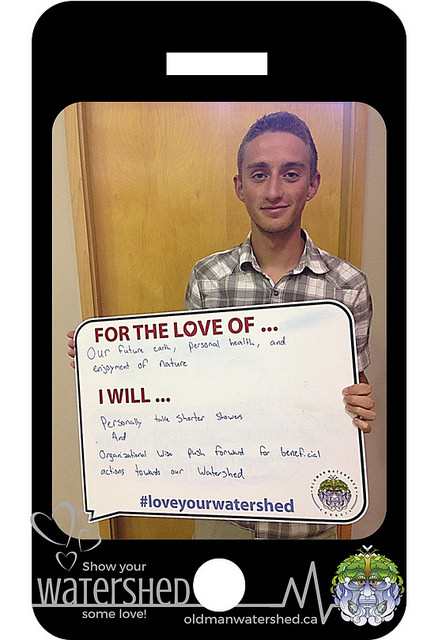Editor's Note: OWC is so proud to see how engaged our local students are in the watershed. Read all about the first annual Earth Day Symposium led by our youngest Board member and University of Lethbridge student, Antoine!
On April 10th, 2018 the University of Lethbridge hosted a student-led Earth Day Symposium. This was the first earth day event that has occurred in while at the University of Lethbridge. This event was led by Antoine Gendron, a student and OWC board member, and his peers Kelsey Turner, Cass Klaas, Alix King, and Bryce Baker from Uvolunteer. Further recognition needs to go out to Uvolunteer, the Teaching Center, Presidents office and all the other people who guided me to sources for their help in making this symposium possible.
"My goal was to connect people to people and people to ideas. If we can all find little ways to contribute and do what we can, the changes will come."
~ Antoine Gendron
The idea for the Earth Day event began last April when OWC hosted their Southern Alberta Water Charter signing day. As the new school year started in the fall, we gathered a few helpers and met to discuss what we wanted this event to focus on. Our main goals for this event were to build connections among students, faculty, and community organizations, as well as to highlight the Earth and success stories from people and research that have contributed to the sustainability and amazing diversity and nature of our planet. We wanted to hear success stories, prevalent issues, and research ideas from faculty members, staff, students, and community organizations. Our goal was to create conversations that were positive to encourage people to continue their efforts in making changes to help the environment and encourage others to join in. We also wanted people to have opportunities to see what is being done and partner with organizations and research if the chance allowed.
There were many speakers and booths at the event:
- Professor Philip Bonnaventure was our keynote speaker with a talk on permafrost and climate change.
- Dr. Maura Hanrahan presented on Mi’Kmaq and Meat in the Modern Era.
- Shannon Frank from OWC came and gave an inspiring "How to tackle all these environment problems?" presentation.
- The City of Lethbridge discussed their sustainability initiatives.
- Phil Dyck, the manager for the grounds and motors vehicle at U of L, brought awareness to the Bio Swales, their purpose on campus, and how to avoid walking in those areas.
- Dr. Nick Savidov, from the Lethbridge College, came to talk about Aquaponics.
- Dr. Stefan Kienzle, of the department of geography, brought his expertise on wildlife conservation.
- Environment Lethbridge shared their recommendations.
- Bill Spenceley from Flexahopper, a plastics company, talked about his initiatives for solar power and how he is being innovative with his company to make it more sustainable.
- Lastly, KEPA brought us multiple reports on important environmental issues.
I was amazed at the quality of speakers that shared, and the diversity of content we got to hear. Even though it was broad in content, everything remained central to the environment. I was very pleased to be able to listen in to each speaker and have talks that were not all scientific, but incorporated social sciences, economics, etc. My hope is to expand on the quality for next year and give more time to share and have conversations in between talks.
At the event we also had booths. UVolunteer, Co-op and Careers Office, two arts students, a forest fire booth from students in Enviro 2000, Purple Carrot, and Lethbridge Sustainable Living Association all had booths set up. Their main focus was to share environmental sustainability and opportunities surrounding work or initiatives in the environmental field. One of the booths was from a group of students taking Environmental Science 2000. Colton Black, Suhail Qayamali, Giancarlo Zaghini, and I did a literature review on forest fires and their effects. More information will be given in a future blog.
Overall this event was a success; it was inspiring, and offered content that could be taken home and mulled over. Improvements need to occur for next year, but I was pleased at the first turnout. I will be looking for more speakers and organizations that want to present or host a booth to share how they are contributing to our planet, or whether there are issues or research they want to highlight. Some improvements for next year are to have better financial planning for the event, better working sound, and more time for the speakers to present. I also want to have longer breaks in between speakers for conversation to occur.
"For the love of our future earth, personal health, and enjoyment of nature, I will personally take shorter showers, and organizational-wise push forward for beneficial actions towards our watershed."
My goal was to connect people to people and people to ideas. If we can all find little ways to contribute and do what we can, the changes will come. I hope that next year even more people will be interested in this event, and that more come to attend and listen to all the quality speakers this city has.
Antoine Gendron






